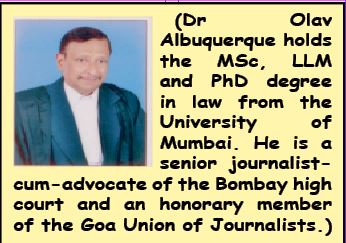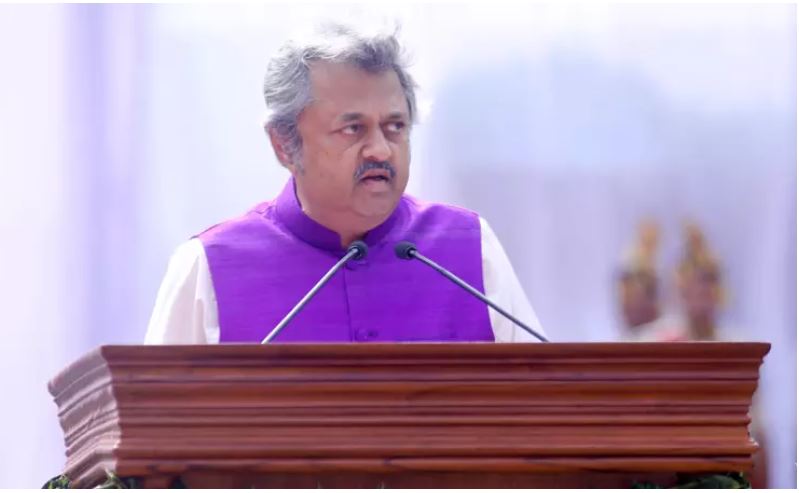Chief Justice (CJ) Ravi Malimath of the Madhya Pradesh high court prefered to serve for Constitution than ‘congregation’ of enemies
By Olav Albuquerque
WHEN judges retire they give farewell speeches which are arguably the most momentous in their careers. This is because while on the bench, high court judges cannot speak their minds if they have been transferred from one high court to another which disrupts their family life, due to relocating in different states. Two judges, one from the Madhya Pradesh high court and the other from the Calcutta high court, have stirred a controversy with their farewell speeches. In Goa, we have excellent judges but it is better for our high court to continue as a bench of the Bombay high court, rather than have a separate high court which may not attract diverse talent from the bar and the lower judiciary.
The last speech was on May 24, when Chief Justice (CJ) Ravi Malimath of the Madhya Pradesh high court lambasted those “people who spent months and years trying to negatively affect” his career. He said his detractors sought to “influence the workings of this court.”
TRUTH STRANGER THAN FICTION
TO return to Madhya Pradesh, Chief Justice Malimath said he served the Constitution instead of the “congregation,” and that he had a lot of enemies – something which he was proud of. He added the transfers he got in his career were “expected to rattle” him “but they did not.” Before being appointed the chief justice of the Madhya Pradesh high court in October 2021, he was the acting chief justice of the Himachal Pradesh High Court from July 2021 to October 2021. He also served as the acting chief justice of the Uttarakhand high court from July 2020 to January 2021.
The Supreme Court collegium had considered elevating Justice Malimath as a judge of the Supreme Court but in 2021 chose Justice B V Nagarathna instead, whose parent high court was the same as Chief Justice Malimath, the Karnataka high court.
Truth is stranger than fiction, because Justice EV Venkataramiah superceded Chief Malimath’s father, Vijay Malimath, who was the chief justice of the Karnataka and Kerala high courts, in 1979 to enter the hallowed portals of the Supreme Court and went on to become the 19th Chief Justice of India in 1989.
His daughter, Justice BV Nagarathna not only superceded CJ Malimath just as her father superceded CJ Malimath’s father, Vijay Malimath in 1979 but will take oath as the country’s 55th and the first woman chief justice of India for 36 days in 2027.
Speaking at his farewell, Justice Malimath said, “You always have a choice – do you serve the Constitution or do you serve the congregation? Serving the Constitution takes you nowhere on a personal level, apart from giving you the satisfaction of having done the right thing. Serving the congregation, on the other hand, can get you to go places.”
JUDGE BEYOND REPROACH
WAS Chief Justice Malimath taking a snide swipe at Justice Nagarathna? We can only speculate. But there is no doubt Justice Nagarathna’s judicial acumen and integrity are beyond reproach.
“I was transferred from Karnataka to Uttarakhand to be made the chief justice there, but I was not. I was then transferred from Uttarakhand to Himachal Pradesh to be made the chief justice there. I was not. Then I was finally elevated as the chief justice of the high court of Madhya Pradesh. These transfers were expected to rattle me, but they did not. I did the opposite – I made long-lasting contributions in each of these places… I’ve served the land of the Vindhyas, Himachal, Yamuna, and Ganga. I have truly served India, and I’m blessed for that opportunity,” he said.
Chief Justice Malimath said those who undermined his career failed miserably because he accomplished what no judge had ever done before in the country. “I can say a lot at this juncture, I can give names and grab the attention of the tabloids,” but he refused to identify those who tried to prevent him from discharging his judicial duties. As a judge of the Karnataka high court from February 18, 2008 to February 3, 2020 he delivered final judgments in 44,886 cases.
This is why the people have a right to know why he was superceded to the Supreme Court, because it is the people of India who are the custodians of the Constitution which CJ Malimath upheld.
Now leaving this judge aside, Justice Chittaranjan Dash of the Calcutta High Court, who is just four days older than CJ Malimath, kicked up a controversy by declaring at his retirement function on May 20 that he had been a member of the RSS which inculcated in him values and a sterling character.
After 23 months as a high court judge, Justice Dash disclosed he was an ardent RSS member earlier. “I have acquired so many good qualities as a Sangh member which helped me dispense justice. The line came spontaneously to me in my farewell speech. I never thought about giving a speech like that. I never thought of saying that I belong to the RSS.”
“I thought if I said so, it might give rise to a controversy. After my speech, a lot of negative comments poured in but I am not bothered about that as I am retired and I have done my bit. I was never biased against anybody. I can say that if you want to become a completely unbiased person, go to the RSS,” the judge said.
The point here is that should not the judge have disclosed his RSS membership before taking oath as a judge? Or the Intelligence Bureau (IB) which is supposed to do a background check on advocates who have been recommended for judgeship, did a shoddy job. His membership of the RSS should have been brought to the notice of the 37th CJI KG Balakrishnan who cleared Justice Dash’s file in 2009. Or perhaps, CJI Balakrishnan thought Justice Dash’s RSS membership was not an issue.
During India Gandhi’s tenure, membership of the RSS would have disqualified a lawyer from becoming a judge. Justice Dash argued that Justice Krishna Iyer was the first CPI minister of Kerala from 1957 to 1959 and was one of the best judges in the annals of the Supreme Court.
“If an organization has shaped your personality, and imbibed benchmark qualities, without being hypocritical you must admit that it is the organization that has contributed to the qualities that I have. I didn’t want to be a hypocrite so I mentioned it. I was in Sangh till I was 28, now I am 60. I joined the service in 1999. It was not RSS, not Janata Dal BJP, or TMC who helped me get into the service. I am ignoring such criticism,” he said.
Justice Dash’s contemporary, Calcutta high court Abhijit Gangopadhyay who is the same age as both CJ Malimath and Justice Dash, has already joined the TMC after a tumultuous tenure as a high court judge where he complained he was not being allowed to deliver justice. For when a judge cannot deliver justice, society crumbles into ignominy.

